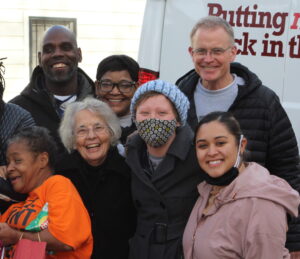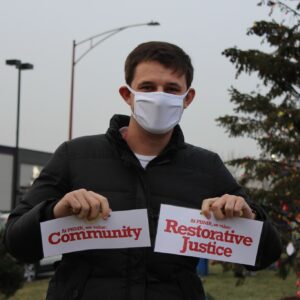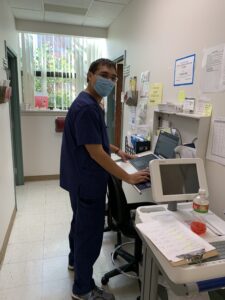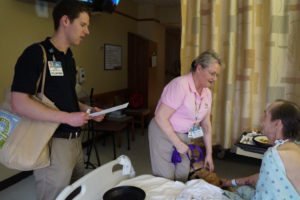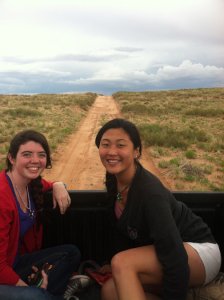Steps on the Journey
By Tim Deveney, Precious Blood Volunteers Director
I have traveled a fair bit during the last 18 years, so I have my packing routine down pretty well. I have different routines for different types of trips. When I pack for recruiting trips to college campuses, I pack pants, button-down shirts, a dressy pair of shoes, and ties for when I’m feeling a bit saucy. If I’m heading to Chicago to visit our volunteers, I’m more of a nice shirt and jeans type of guy. I know to check the weather in every destination I’m going to. It always amazes me how different the weather can be between Chicago and South Bend.
Traveling requires me to think through some of the possible contingencies. Where do I stay that is both comfortable and responsible with the resources the United States Province trusts me with? What’s the best route? Do I really want to pay the tolls to get to Notre Dame, or should I take an extra half-hour on the road to avoid the tolls? Should I rent a car or trust my skills in navigating public transportation? Do I have child care for my kids in the mornings before school? How am I going to get to and from the airport? (Thanks to my mother-in-law and father-in-law for regularly taking care of those last two items.)
Even with all the planning, there is a lot I cannot control. The traffic in Chicago is always a wild card. The places I stay might not be comfortable or quiet (There’s a loud rooster that lived near our volunteers in the Back of the Yards neighborhood in Chicago!). There are usually some unique experiences, sights to see, or new food. I learned about the glory of kolaches thanks to former volunteer Lina Guerrero’s parents in Austin, Texas. I have met some amazing people, some of whom I now count as confidants and friends.
Sometimes there are unexpected difficulties that come up. There are times when I feel tired and have to force myself to take that next step. I have been to recruiting fairs that no students show up to, leaving me with two to four hours of thinking about all the other work I have to do and the burden that my family is bearing because I’m traveling. At visits to our placement sites, I have to have unexpectedly difficult conversations with our volunteers or our placement contacts. Those conversations occasionally involve me having to dive really deep into how I am working with those people.
In November, I traveled to Florida for the Catholic Volunteer Network annual conference. It was our first in-person meeting since 2019. During the conference, one of the participants shared the poem “For Those Who Have Far to Travel” by Jan Richardson during an opening prayer. It’s a meditation on the journey of the Magi. It offered me a much different perspective on the journey the wise men took. She opens her poem:
If you could see
the journey whole,
you might never
undertake it,
might never dare
the first step
that propels you
from the place
you have known
toward the place
you know not.
The story of the Epiphany only appears in Matthew’s Gospel. The “wise men from the East” only appear briefly in Matthew’s infancy narrative. The author of Matthew’s Gospel gives them only two more sentences than Joseph, whose silence makes the wise men seem verbose. The unnumbered group undertakes a journey whose destination they do not know.
 They appear in Jerusalem to get directions. When they arrive in Bethlehem, they give their gifts to Jesus and offer him homage. They renege on their promise to Herod after having dreams in which angels warn them Herod’s intentions are not good. They end up going home a different way. They are a group of people who appear quietly in Matthew’s Gospel, and after giving their gifts and offering homage to Jesus, they just as quietly disappear.
They appear in Jerusalem to get directions. When they arrive in Bethlehem, they give their gifts to Jesus and offer him homage. They renege on their promise to Herod after having dreams in which angels warn them Herod’s intentions are not good. They end up going home a different way. They are a group of people who appear quietly in Matthew’s Gospel, and after giving their gifts and offering homage to Jesus, they just as quietly disappear.
What was their journey like? What did they pack? What new foods did they taste? Who were the people (besides those in Herod’s court and the Holy Family) they met on their journey?
How did they feel on their journey home? Did they feel the exhilaration of getting a glimpse of God’s love, or did they feel let down that God’s glory was in a child born to a young peasant woman and a carpenter instead of in a palace? Were their lives changed by their journey and those they met at their destination? How did they push through when they were tired, thirsty, or hungry?
We are all on journeys, maybe not as profound as the wise men, but journeys nonetheless. Our community is on a journey of discernment and discovery of how we are to witness Christ’s reconciliation in the world. Ultimately, this is a journey of love, inspired by the love of a God who gave us his Son to bring peace, mercy, justice, and truth. The road is hard, but like the wise men, we need to continue on even if we do not know the steps ahead of us. We probably do not even know the place we are going to! Throughout it all, we need to trust the slow work of God and be open to God’s love being revealed to us in unusual ways.
Tim Deveney is the director of Precious Blood Volunteers. Go to preciousbloodvolunteers.org to learn more about Precious Blood Volunteers.
This article originally appeared in the January 2023 edition of “The New Wine Press.”
Excerpt from “For Those Who Have Far to Travel” © Jan Richardson from Circle of Grace: A Book of Blessings for the Seasons. Used by permission. janrichardson.com

